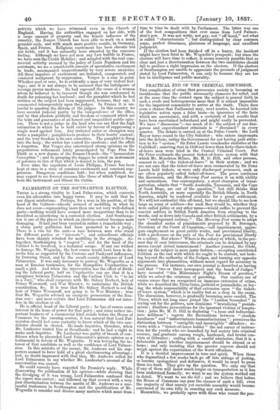P.AIMERSTON ON THE SOUTHAMPTON ELECTION. THERE is a strong vitality
in Lord Palmerston, which converts even his adversities into happy turns. It may be said, that he can digest misfortune. Perhaps, for a man in his position, at the head of the Cabinet—already accused of meddling in what he does not avow—representing more than one not very well-defined party—nothing would have seemed more inopportune than to be described as interfering in a contested election. And Southampton is one of the places in which an election-contest becomes most damaging. It had just been vacated in rather a remarkable way ; a sharp party politician had been promoted to be a judge. There is a run for the seat—a race between men who stand for different parties or " interests " ; and subordinate officials have been sharply rebuked for meddling in the struggle. Altogether, Southampton is " suspect" ; and for the head of the Cabinet to be involved, is a technical scrape. If any one wished to damage Mr. Weguelin, the best course would have been to describe him as supported by the Customs and Dockyard influences,. by Downing Street, and by the occult county influence of Lord Palmerston. It was only necessary to portray Mr. Weguelin as a man of Russian tendencies, for the Hampshire Urquhartites to smell a plot. And when the intervention has the effect of dividing the Liberal party, half an Urquhartite can see that it is a conspiracy between Palmerston and the Carlton Club to "to let in a Tory," who shall cooperate with Mr. Sidney Herbert, heir of Prince Woronzoff, and War Minister, to undermine the British constitution, &c. It is true that Mr. Sidney Herbert is no the heir of Prince Woronzoff, nor going to be War Minister ; true that Mr. Weguelin advised an energetic prosecution of the Russian war ; and most certain that Lord Palmerston did not interfere in the election at all.
He is official head of the Liberal party ; he has of course some interest in the lease of power for that party ; and since rather important business of a commercial kind stands before the House of Commons for the ensuing session, it was natural that Lord Palmerston should feel some curiosity to know which of the two candidates should be elected. He made inquiries, therefore, when Mr. Lankester visited him at Broadlands : and he had a right to make such inquiries. Mr. Lankester was guilty of breach of confidence when he placarded Lord Palmerston's private opinion as a testimonial in favour of Mr. Weguelin. It was betraying the interest of that candidate as well as the confidence of Lord Palmerston. In this mistake of the enemy, Mr. Andrews and his supporters seemed to have hold of a great electioneering advantage ; and, no doubt impressed with that idea, Mr. Andrews called for Lord Palmerston to say whether Mr. Lankester's account of the conversation was correct.
He could scarcely have expected the Premier's reply. "While disavowing the publication of his opinion—while showing that the divulging of it was wrong, Lord Palmerston confessed that the report was correct ; and followed up that avowal with a very just discrimination between the merits of Mr. Andrews as a successful tradesman in Southampton and the qualifications of Mr. Weguehn to consider and discuss many matters which must from
time to time be dealt with by Parliament. The letter was one of the best compositions that ever came from Lehi Palmerston's pen. It was not witty, not gay, not "off-hand," not what is called " characteristic " ; but distmguished by clear common sense, perfect directness, plainness of language, and excellent judgment. If the election had been finished off in a hurry, the incident might have been fatal to Mr. Wevelin's prospects; but since the electors will have time to reflect, it seems scarcely possible that so clear and just a discrimination between the two candidates should fail to produce a right impression on the electors. If the electors of Southampton are unable to appreciate the grounds of judgment stated by Lord Palmerston, it can only be because they are too low in intelligence and public morality.




























 Previous page
Previous page